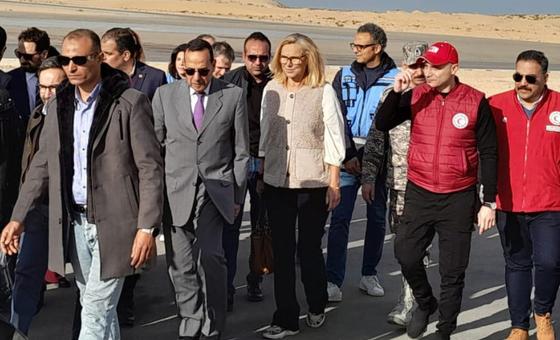The UN Senior Humanitarian and Reconstruction Coordinator for Gaza is in Egypt this week in efforts to scale-up assistance to the enclave, where more than 100 days of war between Israel and Hamas militants have left most of the population in dire need of food, water, medicines and other basic items.
Sigrid Kaag was appointed to monitor and verifying aid shipments into Gaza, in line with a UN Security Council resolution adopted last month.
She will also work to establish a mechanism for accelerating aid into Gaza through States that are not party to the conflict.
Acute needs
Speaking in Al-Arish, North Sinai, on Wednesday, Ms. Kaag said she was in Egypt “to see how we can facilitate, accelerate and expedite all areas of the assistance that is so much needed for civilians in Gaza, given the very acute humanitarian conditions that they have to live with.”
Ms. Kaag arrived in the capital, Cairo, on Monday, where she held “very good meetings and discussions” with the Ministers responsible for Foreign Affairs, Social Solidarity and Defence, as well as the Egyptian Red Crescent Society.
“This is a very important visit because we see firsthand how much Egypt is doing with the volunteers and the government and everybody involved, to provide humanitarian assistance for the innocent civilians in Gaza,” she told reporters.
She said the visit “is for me to see to discuss with colleagues how to improve how we can assist the Government and the Red Crescent, as they wish, and how they see it useful, so we can ultimately benefit the civilians, innocent civilians, in Gaza.”
Ms. Kaag is on route to Rafah, one of two crossing points for aid into Gaza.
The UN humanitarian affairs office, OCHA, reported on Wednesday that 204 trucks carrying food, medicine and other supplies, entered the Gaza Strip through the Rafah and Kerem Shalom crossings between 15 and 16 January.
The Palestine Red Crescent Society received 25 trucks from the Egyptian Red Crescent through the Rafah crossing on 16 January which contained humanitarian aid, including food, water, medical supplies and other relief items.
More than 500 trucks carried aid into Gaza every day before the start of the current hostilities on 7 October.

